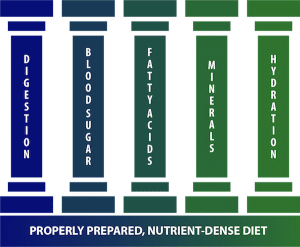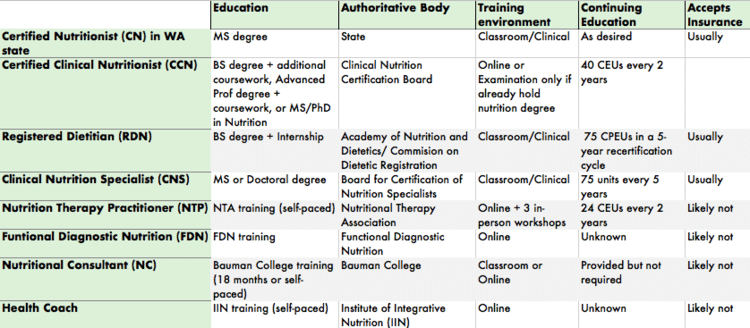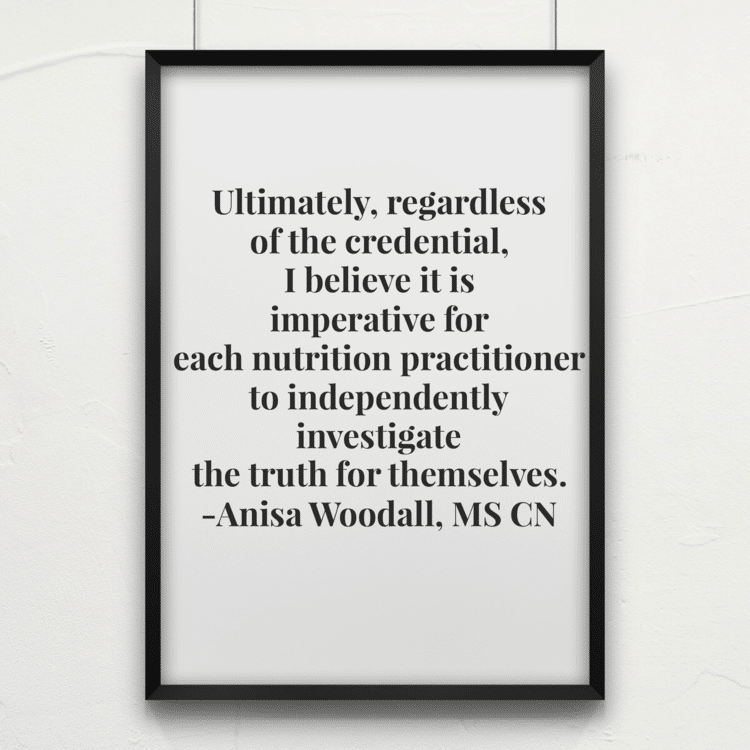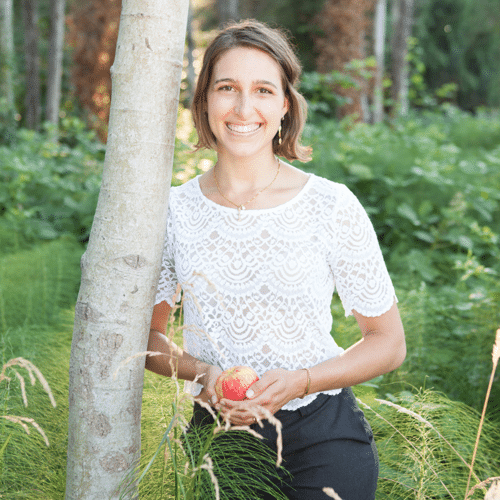I have looked high and low for a good article that clearly explains the differences between the numerous nutrition qualifications. So, when I had exhausted all sources I turned to my friend Anisa Woodall who is a Certified Nutritionist to see if she could explain to me the differences between the various certifications/qualifications. The following article was written by Anisa Woodall, CN (Certified Nutritionist) who holds a Masters of Science degree in Clinical Nutrition and Dietetics from Bastyr University.
Unfortunately, the term “qualified” is relative because there are many people with the most widely accepted nutrition credential, Registered Dietitian, whose training is quite antiquated. Though, that’s not to say that all RDs are not up to date with current evidence in the field.
When I first started my training in becoming a nutritionist, my intention was to become a Registered Dietitian (RD). At the time, my understanding was that an RD was the most well-respected credential to have and that I needed to complete that training in order to fulfill my dream of working one-on-one in private practice with people through therapeutic eating patterns who are motivated to improve their health. However, as I went through my schooling and learned more and more about the field of nutrition, I became skeptical and even hesitant to claim the title of “RD”. I’ll explain why below.
There are many different qualifications and credentials for nutrition practitioners. Overall the goal is the same: help others improve their health through nutrition. Here are some of the most common nutrition credentials (You may also see this information summarized in the table I created below):
This post contains affiliate links.

CERTIFIED NUTRITIONIST (CN)
Each “CN” credential can be different depending on the licensing department of each state but in Washington, the state requires every Certified Nutritionist to have at least a Master of Science degree in Clinical Nutrition. Certified Nutritionists are permitted to work in private practice/nutritional counseling settings but not in the hospital setting. We do not have a required amount of continuing education credits though, to practice successfully, it would be a good idea to continue education anyway. We are free to practice based on our experience and learning.
REGISTERED DIETITIAN (RD/RDN)
The Academy of Nutrition and Dietetics is the governing board for RDNs. Currently, to become a dietitian, one needs to have either a BS or MS in nutrition. In addition to that, one needs to complete a Dietetic Internship through an accredited Institution. After completion of these prerequisites, the internship graduate is required to sit for the Commission on Dietetic Registration’s (CDR) exam before receiving the “Registered Dietitian Nutritionist” credential. Although all RDNs vary in how they practice, the current system still trains them “conventionally” and they are expected to practice in alignment with the Academy’s values, some of which I agree with, most of which I don’t. See the Academy’s position papers here.
Dietitians generally practice in three different career areas: community, clinical, and food service. Though each internship requires a minimum amount of hours from each study area, usually each has a different focus. For example, if an intern does a clinical internship, he/she typically will spend the majority of his/her hours in a hospital or a long-term care/rehabilitation facility with little to no “private practice” experience. This clinical training prioritizes management of tube feeding formulas and parenteral (IV) nutrition.
Some states require dietitians/nutritionists to have the RD credential, so I totally understand that there are for sure Registered Dietitians who practice from a more holistic, informed perspective. I just didn’t want this option for myself.
CERTIFIED CLINICAL NUTRITIONIST (CCN)
This certification is administered through the Clinical Nutrition Certification Board. You can see the requirements here for non-nutrition degrees, but generally if you already have at least a Masters degree in Nutrition, only the examination is required and approved continuing education units for re certification.
CLINICAL NUTRITION SPECIALIST (CNS)
Certified through the Board for Certification of Nutrition Specialists, an MD, DO or other healthcare provider can become a CNS with additional nutrition training. In order to become a CNS, a healthcare provider must have either a Masters or Doctoral degree in nutrition or other healthcare field. This is great for those practitioners who choose to specialize in nutrition after already completing their medical training (which is minimal in nutrition education). See here for specific requirements. CCN and CNS are both very similar in education requirements.
NUTRITIONAL THERAPY PRACTITIONER (NTP)
The Nutritional Therapy Association is the organization that trains NTPs. The curriculum is online though there are some in-person workshops. According to the NTA, “a Nutritional Therapy Practitioner does not diagnose or treat disease, but instead makes nutritional recommendations for balancing the body and promoting optimal wellness.” I would say I practice very much in alignment with this Association’s philosophy. While I was going through my Master’s program, I downloaded the NTA’s recommended reading list and put together the pieces with my academic training.

FUNCTIONAL DIAGNOSTIC NUTRITIONIST (FDN)
The founding organization for FDNs is Functional Diagnostic Nutrition. A FDN uses a variety of testing such as hormonal, gastrointestinal, food sensitivity, and other lab tests to help identify the root cause of someone’s chronic health issues. They then work with the client to progress out of that.
This credential can be obtained by anyone as long as they do the necessary training; one does not need to be a licensed healthcare provider. A Naturopathic Doctor (ND) or Functional Medicine Practitioner is also trained to perform these tests in addition to their other qualifications.
NUTRITIONAL CONSULTANT (NC)
Bauman College trains its students to be Nutritional Consultants. Typically Bauman College is more whole-foods oriented in their training, though it historically favors plant-based diets.
Would you like to save this?
HEALTH COACH
The Institute of Integrative Nutrition is an online nutrition school that trains Health Coaches. However, there are several other companies and organizations that also train “Health Coaches”. According to the IIN, “A Health Coach is a supportive mentor and wellness authority who works with clients to help them feel their best through food and lifestyle changes. Instead of prescribing one diet or way of exercising, Health Coaches tailor individualized wellness programs to meet their clients’ needs.” Typically insurance does not cover this type of care.

What does “Nutrition” mean though?
You can go to a “nutrition” store and find only supplements and powders. You can see a dietitian at a hospital and receive a formula made from synthetic vitamins, corn syrup and (inflammatory) industrial seed oils. You can see a nutritionist and receive a therapeutic eating plan of real, whole foods for your specific condition. The point I’m trying to make is that, currently, nutrition simply means: putting edible products into your body, regardless of whether those products promote health or not.
In my mind, nutrition means consuming organic molecules originating from natural sources (plant and animal) that are metabolized in our bodies to nourish mind, body and spirit. Nutrition is more than just eating macronutrients such as carbohydrate, fat, and protein or micronutrients such as vitamins and minerals. There are molecules found in plants and animals that still haven’t been discovered! Does that mean we don’t benefit from them? The synergistic effect of food needs to be considered when trying to nourish our bodies.
Food synergy is the idea that interrelations between food constituents are significant. The authors of one research article argue that most nutrition research is performed with reductionist logic and that the supplement industry is based on “the supposition that nutrients have the same health effect delivered in isolation or as a constituent of food.”
Why I Chose To Become a Certified Nutritionist.
The reason why I chose to become a Certified Nutritionist is because I want to work one-on-one with people who are motivated to improve their health through food, movement, and lifestyle changes, both under a cash-pay and an insurance model. Because I felt adequately prepared in my Master’s program and student clinic experience at Bastyr University in advanced nutritional biochemistry, nutritional counseling, individualized patient care, using whole foods as medicine and more, I felt my time would be best spent skipping a clinical Dietetic Internship that would be training me in sick-care instead of healthcare. My Masters training involved the majority of the training and philosophies from the other credentials that I listed plus more.
Learning in my Medical Nutrition Therapy (MNT) class that Nestle (yes, the candy company) is the company that provides the formulas for the hospital tube feeds was enough for me to question my career path. Throughout my schooling, I suffered with the internal dilemma of “Do I really want to be represented by an organization who receives funding from McDonald’s, Kellogg’s, and Monsanto? At the time, those companies sponsored continuing education events for dietitians, which was a major red flag for me. It was after I found the Center for Nutrition Advocacy that I was relieved that I could still practice as a nutritionist in a clinical setting and be able to accept insurance without becoming a dietitian.
Ultimately, regardless of the credential, I believe it is imperative for each nutrition practitioner to independently investigate the truth for themselves. It is my duty as a nutritionist to remain informed about the ever-growing body of scientific evidence while acknowledging the value in traditional wisdom.

I still remember on orientation day for my Masters program, the department chair telling my classmates and I something along the lines of:
“Nutrition information is always changing. If you only take one thing away from your experience at Bastyr University, it should be that we are teaching you how to be a critical learner.”
Under the CN credential, I have the freedom to interpret the evidence for myself and can receive continuing education wherever I please without being concerned if it’s “approved” by certain organizations. Though Washington State currently does not require CNs to have continuing education, I still hold myself to the same standard as RDs and CNSs. Continuing education that I enjoy receiving is those provided through the Board for Certification or Nutrition Specialists, the International College of Human Nutrition and Functional Medicine, Institute for Functional Medicine, Nutritional Therapy Association, The Institute for the Psychology of Eating, and more. If I could create the “ideal” nutrition training program, I would combine Bastyr’s Master’s degree program with the NTP and FDN curricula. The beauty of being a Certified Nutritionist is that I can still choose to learn from those perspectives even though I’ve completed my academic training.
“The root cause of wrongdoing is ignorance, and we must therefore hold fast to the tools of perception and knowledge.
– `Abdu’l-Bahá
About Anisa Woodall, CN
Practicing from an integrative and functional medicine perspective, Anisa keeps the whole body in mind when providing sustainable and practical nutrition and fitness solutions for her patients. Knowing every patient has a different story, a different lifestyle, and individual nutritional needs, she helps patients make informed decisions that fit their lifestyle. Anisa believes whole foods are the best option when treating through diet, though will recommend supplements as needed. To better serve you, she seeks to work with your healthcare team, bridging the gap between Western/allopathic medicine and natural medicine.

If you’re loving this nutrition blog post let us know by commenting below. Also, remember to share with us on social by tagging @Raepublic and #Raepublic!
This post may contain affiliate links, meaning I’ll receive a commission if you purchase through those links at no extra cost to you. Please read our full disclosure for more information. Thank you for supporting Raepublic.






